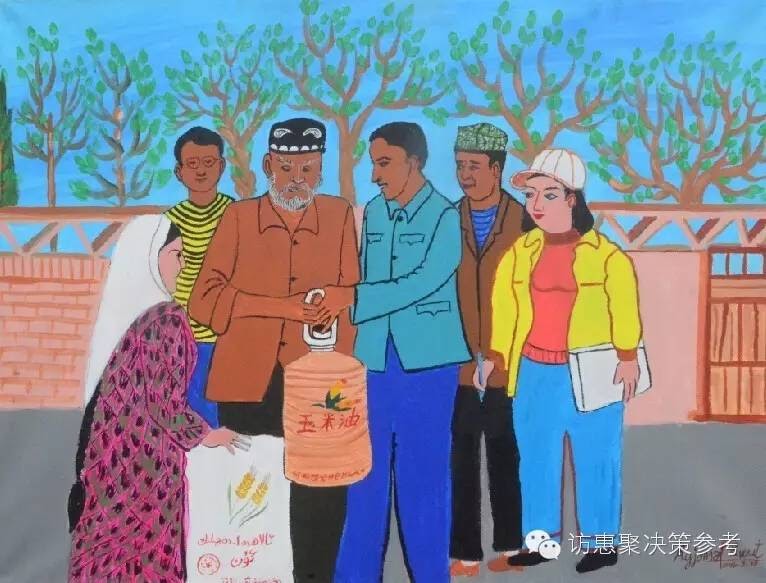Hosting the hostage: Looking beneath China’s policy to infiltrate Uyghur homes
While programs such as “Visit the People, Benefit the People, and Bring Together the Hearts of the People” 访惠聚 and “United as One Family” 结对认亲 have conscripted over 1 million Han civilians and sent them to live with Uyghurs in arranged homestays, the Chinese Communist Party’s contrived attempt to require Han people to share intimate moments and spaces with Uyghurs is fraught with paternalism, deception, and ethnocentrism; as such, it will be unlikely to alleviate Uyghur distrust of the Party and Han people.

Teams made up mostly of Han civil servants rarely show up to Uyghur homes empty-handed.
They come bringing their unsuspecting Uyghur “hosts” food, furniture, clothing, and school supplies. As the work teams shower their assigned families with gifts, they make their intentions clear: They’re going to eat, sleep, and work alongside them for the foreseeable future; the request is irrefusable.
This government-imposed living arrangement is common in Xinjiang, the Chinese administrative unit that surrounds the Uyghur homelands. In fact, programs such as “Visit the People, Benefit the People, and Bring Together the Hearts of the People” 访惠聚 and “United as One Family” 结对认亲 have conscripted over 1 million Han civilians and sent them to live with Uyghurs in arranged homestays. However, the Chinese Communist Party’s contrived attempt to require Han people to share intimate moments and spaces with Uyghurs is fraught with paternalism, deception, and ethnocentrism; as such, it will be unlikely to alleviate Uyghur distrust of the Party and Han people.

How to be an uninvited guest
Hospitality — especially the razor-thin line separating hosts from guests — is the unstable fulcrum on which the CCP’s efforts to create familial-type bonds across ethnic boundaries are placed. Indeed, work teams assume, albeit briefly, the identity of unassuming and gracious guests before they trap, contain, and (attempt to) subdue Uyghur families. To properly perform this role, civilian workers are first instructed to simply mind their manners. A manual used in Kashgar Prefecture recommends work teams to: (1) knock first; (2) greet the family; (3) observe door etiquette; (4) display proper comportment; (5) hug children; (6) respect elders; (7) receive items with two hands; (8) say “thank you”; (9) leave if you have inconvenienced the family; and (10) end the visits with a “good-bye.” In addition to these basic guidelines, each team carries out at least one practical act of kindness — i.e., assistance, care, or a congratulations — during each visit to further build rapport with their assigned families.
Knowledge of Uyghur customs is abused to help work teams gain access to reluctant families. One female Han civil servant recommends that a local (i.e., Uyghur) female cadre knock on the door because a woman — the individual most often responsible for maintaining the house during the busy farming seasons (and the least likely to be disappeared in a concentration re-education center) — will probably greet a visitor. She further claims that households rarely accept visitors if the patriarch is not at home, but following these steps prevents any unwanted “awkwardness” regardless of who may answer the door. In another attempt to gain access to Uyghur families, work teams sometimes inspect homes late at night. Called on by uninvited guests, local families have little choice but to provide their visitors with a room or their own bed.

Gifting is central to the success of the home visits. In addition to presenting families with tangible gifts, work teams are to bestow secular knowledge on Uyghur communities. Officially, this strategy is known as the “four commons, four gifts” 四同四送, which refers to civil servants eating, living, working, and studying alongside Uyghur families while they gift them kindness, knowledge about religious policy, law, and Han culture. As such, work teams and their Uyghur “families” spend the days attending lectures, practicing Mandarin Chinese, discussing Han festivals, and participating in public displays of patriotism.
These “gifts” are part of the CCP’s broader civilizing project to assimilate ethnic minorities into the Han mainstream. As with most instances of gift giving in contemporary China — especially government altruism — the act demands reciprocity. Recipients of the CCP’s “care,” or what Jennifer Pan describes as “repressive assistance,” Uyghurs become engulfed in rénqíng 人情, which is “the bond of reciprocity and mutual aid…based on emotional attachment or the sense of obligation and indebtedness.”
Guests — or hostages — in their own homes
Having set the traps and baited them with gifts, the work teams can spring them. According to the expectations of renqing, when Uyghur families accept the gifts — voluntarily or reluctantly — they become indebted to the work teams and by extension the Party in a sudden transposition of the host-guest relationship. Drawing on Pitt-Rivers’s theories about hospitality, sent-down workers intentionally violate and invert the laws of commensality. In the most obvious example of this role reversal, work teams supply food, prepare it for their Uyghur “relatives,” and share these meals on tables provided by the government. Becoming the recipients of state renqing, Uyghur families incur social and political debt. Therefore, the seemingly casual gesture of sharing a meal is an exercise of power: The act purports that Uyghur “hosts” are incapable of providing for their government-dispatched “relatives.” Consequently, mutual assistance is uprooted from social networks cultivated within Uyghur neighborhoods (Uy. mähällä) and buried deep inside the Han-dominated Party-state.
Now relegated to the role of guests — if not hostages — inside their own homes, Uyghurs are expected to reciprocate by displaying gratitude, cooperation, and compliance. To be sure, work teams do not expropriate domestic space, but they effectively occupy and repurpose it for government use. Indeed, in the company of civilian work teams, Uyghurs families no longer have agency over domestic affairs. To display proper guest etiquette — and more importantly, avoid harsh punishment — Uyghurs cannot refuse to answer questions posed by their government-appointed hosts. Uyghur “reciprocity,” then, allows civil servants to work unabated to document every individual’s ethnic status, age, income, political affiliation, religious beliefs, education level, relationship with the “targeted population,” and even the materials used to build the family’s house.
Pried open and occupied by government agents, the house is also scoured for manifestations of “extremism.” Signs of this deviance include practices as mundane as using the greeting Assalamu alaykum (“Peace be upon you”), maintaining a pious appearance, keeping a Qur’an at home, engaging in unsanctioned religious practices, and even owning a tent. The work team manual from Kashgar Prefecture provides an extensive list of questions intended to uncover latent extremism: Does the family have guests from another locale? Do they have too many knives or cleavers? Do they choose to watch VCDs instead of state television? Have they hung religious articles in the home? An individual’s “stubborn” commitment to these behaviors — or impudence directed at their Han hosts — is likely grounds for internment.
Government-imposed inter-ethnic mingling in Xinjiang adds another crippling impediment to Uyghur (im)mobility. Formerly one of the few Uyghur spaces that existed beyond the government’s high-tech surveillance state, the home now sits at the center of CCP human intelligence gathering. Indeed, the composition of this newly forged “blended” family is not one comprised of tughqanlar, or the Uyghur vernacular understanding of relatives — relationships built upon an equal exchange of labor and economic capital; rather, it is an asymmetrical Han big brother/sister-Uyghur little brother/sister arrangement that is characteristic of majority-minority relations in China’s “big family.”






